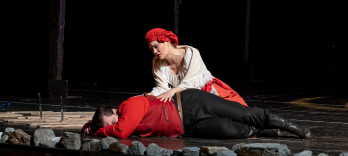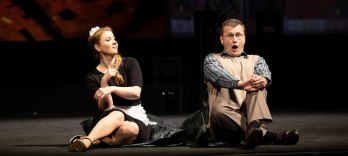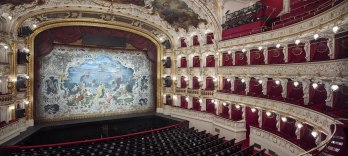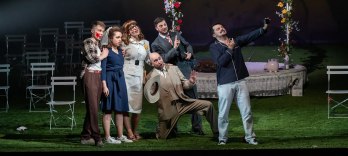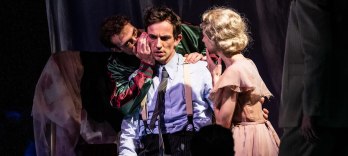Cavalleria rusticana, I Pagliacci
Mo | Tu | We | Th | Fr | Sa | Su |
Synopsis Pagliacci
The synopsis corresponds to the story’s representation in the current production.
Act One
An ambulant troupe of comedians break camp on the plain in the vicinity of a Sicilian village. The comedian, Tonio, announces that what the audience is about to see is a true story (Si può?). The next morning a group of villagers steal into the camp. In their eyes, the “travelling people” belong in the lowest rank of society, and they treat them accordingly. They feel free to rummage through the comedians’ props and costumes, and set out to use them for their own entertainment. The comedians awaken, rush out of their wagons and try desperately to salvage their property, humble yet indispensable to them. The only villager who takes their side and treats with courtesy the comedienne, Nedda, is young Silvio. The troupe’s head, Canio, quickly calms the villagers down. One of the villagers makes an indolent joke about Nedda being secretly courted by the comedian, Tonio. Canio then turns to all with a menacing address: he will not tolerate any attempt at off-stage flirting – real life and theatre are not the same thing (Un tal gioco, credetemi). He then goes off to the tavern. Nedda is shocked by the violence of Canio’s outburst (Qual fiamma avea nel guarda!); she then gazes up at the sky, feeling envy for the birds’ freedom (Stridono lassù). Tonio, who is indeed in love with her, continues to try and gain her favour, but Nedda mocks him. After Tonio’s departure appears Silvio. He and Nedda profess love for each other, and eventually she agrees to elope with Silvio after the show (Silvio! A quest’ora). Tonio, vengeful, brings back Canio, but Silvio manages to escape in time. Canio threatens Nedda, but she refuses to tell the name of her lover. Peppe holds the enraged Canio back: the show is about to begin in no time, and they need to put on their costumes. All then depart. Left alone, Canio succumbs to despair: he has to perform a comedy while his heart breaks – after all, the audience want to laugh (Recitar! – Vesti la giubba).
In the course of orchestral intermezzo, several film sequences illustrate the story of Canio and Nedda. She was found by Canio years before by a roadside, a wretched little orphan whom he took under his care and brought up. Nedda grew up to become a beautiful and talented acrobat, Canio fell in love with her and married her. However, his obsessive jealousy and coarse manners soon destroyed their relationship, resulting in a life together spent in endless fights.
Act Two
The show begins. Pagliaccio (Canio) is expected to stay out until late at night, and Colombina (Nedda) eagerly awaits her lover, Arlecchino (Peppe). In the meantime, Nedda is courted by Taddeo (Tonio). She sends him off, and lovingly receives Arlecchino (Peppe). Pagliaccio (Canio) then unexpectedly returns, reproaches Colombina (Nedda) for her unfaithfulness, and insists that she should tell him the name of her lover. By now everyone starts to feel that what is happening on stage ceases to be a theatre play, that they have a real-life story playing before their eyes. Nedda attempts to steer Canio back to his role, but he furiously declines (No! Pagliaccio non son). Finally, he stabs Nedda, and then also despatches Silvio who has come to her rescue. After that he turns to the terrified audience, to announce that the comedy is finished. Tonio realizes that is responsible for Canio’s insane fit of jealousy which has ended in a double murder, and runs off in utter despair.
Synopsis Cavalleria rusticana
The synopsis corresponds to the story’s representation in the current production.
With his rendition of the famous Siciliana (O Lala, ch’ai di latti la commisa), Turiddu takes leave, after a night together, of his paramour, Lola. He is unaware of being watched by his lover, Santuzza, whom he deceives with Lola, and also by Lola’s husband, Tonio, who has returned from a business trip earlier than expected. Tonio draws a knife, but Santuzza sounds the alarm and Turiddu escapes, undetected.
The first of a series of film sequences is retrospective, showing Tonio, a down-and-out comedian, settling in a village where he then makes a meagre living as a penniless farmhand. One day, he wanders by an abandoned camp of a travelling troupe of comedians, from which he takes a tractor previously used for towing the troupe’s wagons. The vehicle proves helpful in his subsequent rapid rise to the position of a successful deliverer and well-to-do businessman. Eventually, he ends up as one of the village’s foremost notables.
The inn kept by Turiddu’s mother, Lucia, is entered by Santuzza, the young woman with whom Turiddu became engaged after his return from military service. However, he did not forget his previous lover, Lola, and presently renewed contacts with her, losing interest in Santuzza. Meanwhile, Tonio boasts to locals that Lola is a devoted and faithful wife to him (Il cavallo scalpita), even though he suspects that her unfaithfulness is by now known to everyone in the village. Presently, all leave for the church, praying on their way (Regina coeli laetare).
Santuzza despairingly confides to Lucia that Turiddu has once again yielded to Lola’s charms (Voi lo sapete, o mamma). She then meets Turiddu and begs him to return to her – in vain. After being mocked by Lola herself, who is passing by and then proceeds on her way to church, followed by Turiddu, Santuzza puts a curse on her unfaithful lover. The combination of anger and jealousy then drives her to revenge: she confirms the two lovers’ illicit affair to Tonio.
In the course of orchestral intermezzo, another retrospective film sequence shows Turiddu and Lola, a local belle and object of his affection. She, however, attracts the interest of the wealthy Tonio who makes it happen that Turiddu is drafted. Tonio himself then marries Lola.
After mass, Turiddu and the villagers gather together for a glass of wine at the inn (Viva il vino spumeggiante). Turiddu invites Tonio to share a toast with him, which the latter declines with contempt. Turiddu challenges him to a duel with knives; he admits his guilt, and is determined to fight – to him, it is a matter of honour. Then, seized by an evil premonition, he bids farewell to his mother (Mamma, quel vino è generoso), pleading with her to take care of Santuzza if he falls. While the duel is taking place beyond the village boundaries, in front of the inn Mamma Lucia and Santuzza anxiously await its outcome. Shouts carry in from a distance: Turiddu was killed.
Program and cast
Pagliacci
Conductor: Richard Hein
Nedda: Yukiko Kinjo
Canio: Michal Lehotský
Tonio: Daniel Čapkovič
Silvio: Csaba Kotlár
Beppe: Daniel Matoušek
First villager: Tomáš Bartůněk
Second villager: Zdeněk Haas
Cavalleria rusticana
Conductor: Richard Hein
Santuzza: Victoria Khoroshunova
Turiddu: Alejandro Del Angel
Lola: Michaela Zajmi
Tonio (Alfio): Daniel Čapkovič
Lucia: Yvona Škvárová
Approximate running time: 3 hours, 1 intermission (30 minutes)
Language: In Italian, surtitles in Czech, English
Prague State Opera
The State Opera today
The State Opera (formerly the State Opera Prague, between 1948 and 1992 the Smetana Theatre, and originally the New German Theatre) has been a part of the National Theatre since 2012. The Opera and Ballet ensembles give repertory performances at the State Opera.
History
The Prague State Opera resides in the building which on January 5, 1888 was opened as a Prague German stage with the performance of Wagner’s opera, The Mastersingers of Nürnberg. In the 19th century, Prague Germans performed in the Estate’s Theater in alternation with a Czech company. Desire for their own theater led to negotiations in 1883 for the construction of a new theater building for the German Theater Association. Over the next three years, a blueprint was drawn up and handed over to the Vienna atelier of Fellner and Hellmer. Also sharing in the design was the architect of the Vienna Municipal Theater, Karl Hasenauer, while Prague architect Alfons Wertmüller took part in the construction. Financing came from private collections. With its spacious auditorium and neo-Rococo decoration, this theater building is among the most beautiful in Europe.
Access:
By car
On Wilsonova street, from the left lane close to the State Opera building take the slip road to the Slovan above-ground garage. The parking fee is 40 CZK/h.
By tram
By daytime tram No. 11 to the stop “Muzeum”, through the underpass beneath Legerova street in the direction of the NationalMuseum, at the crossroads turn right along the NewBuilding of the NationalMuseum.
By daytime trams Nos. 3, 9, 14 and 24 or night trams Nos. 51, 52, 54, 55, 56 and 58 to the stop “Václavské náměstí”, then by foot uphill on the left side of the Wenceslas Square to the traffic lights across Wilsonova and Vinohradská streets. Then turn left along the NewBuilding of the NationalMuseum.
By metro
To the “Muzeum” station, lines A and C (green and red), and then by foot along the NewBuilding of the NationalMuseum.
Performances: We 11 Sep 2024, 08:30
Performances: Th 09 May 2024, 00:00
Performances: We 08 May 2024, 00:00
Performances: Th 26 Sep 2024, 08:30
Performances: Fr 17 May 2024, 00:00
Performances: We 11 Dec 2024, 12:00

 EN
EN DE
DE IT
IT FR
FR ES
ES RU
RU JP
JP RO
RO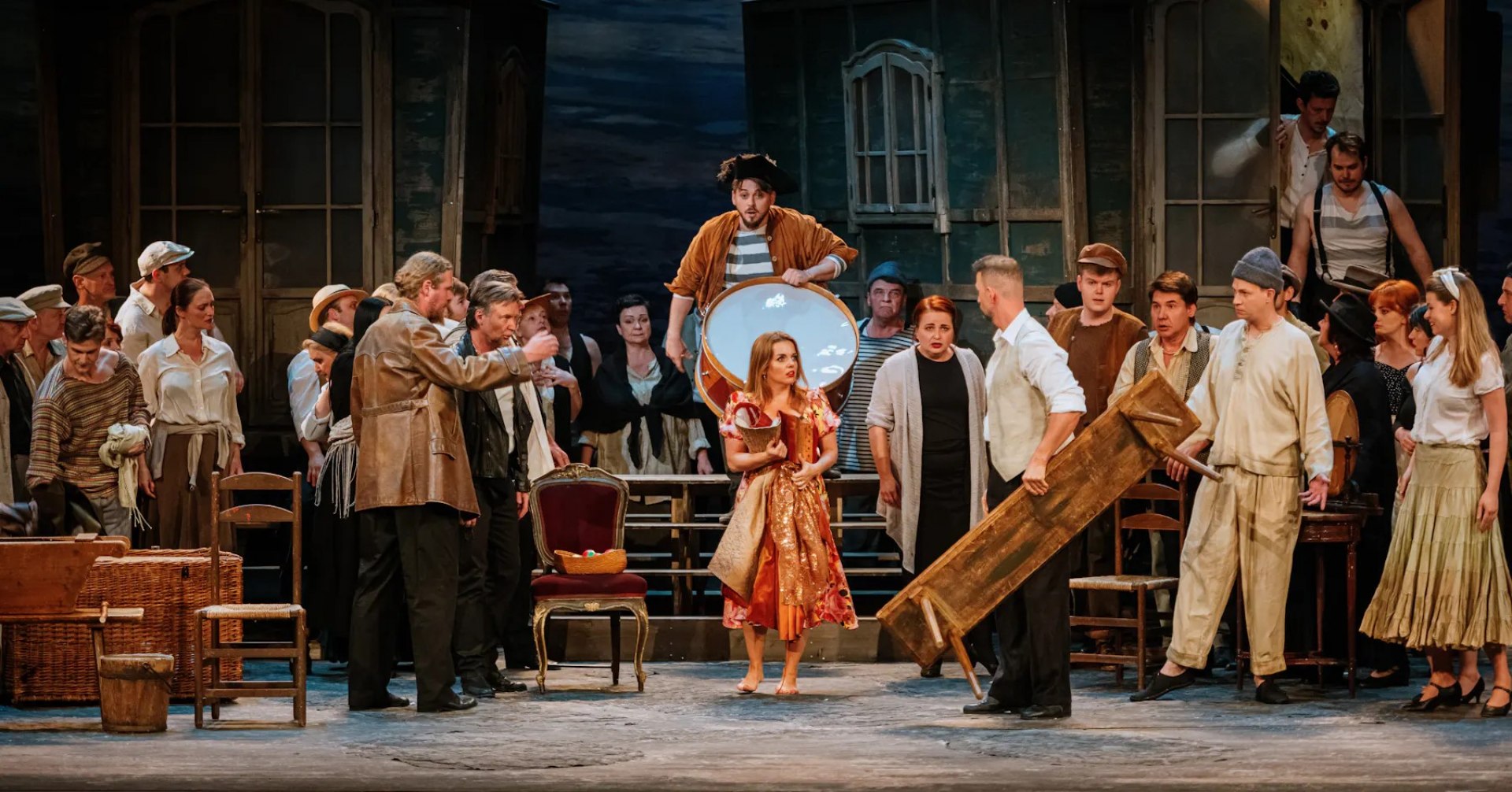
 Seating plan
Seating plan 
